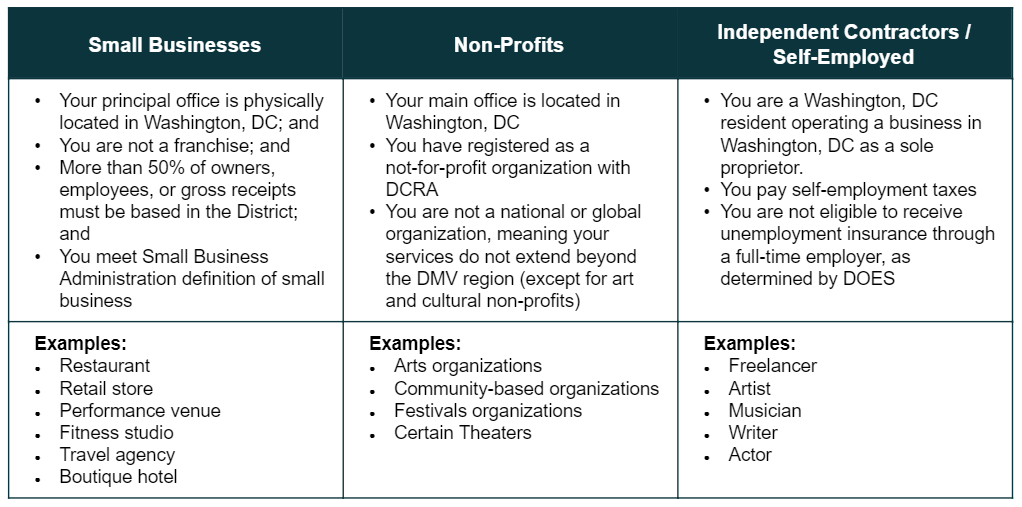COVID-19 Legal Updates: Washington, D.C. Mayor Order No. 2020-053
March 25, 2020
On March 24, 2020, D.C. Mayor Muriel E. Bowser issued an order (“Order”) to close all non-essential businesses to slow the transmission of COVID-19 and protect all members of Washington, D.C., especially residents most vulnerable to the virus, EMS, and local health care providers.
Mayor Bowser’s Order is based on guidance provided by the U.S. Department of Homeland Security’s Cybersecurity and Infrastructure Security Agency.
The Order is accessible here.
DURATION
The Order goes into effect at 10:00PM on March 25, 2020. The Order will remain in effect through April 24, 2020, or until it is rescinded, superseded, or amended by a subsequent order.
GENERAL REQUIREMENTS
Large gatherings are prohibited. Large gatherings are defined as any convening of 10 or more people at the same time, together, in a single confined space indoor or outdoor.
This limitation does not apply to:
- Essential businesses and groups performing essential government functions;
- Gatherings on federal property;
- Spaces where people maybe waiting for transit; and
- Office space, hotels, or residential buildings so long as the space is not used to host a large gathering.
All persons should maintain at least six feet of distance from other individuals. The Order also encourages washing hands with soap and water for at least 20 seconds or the use of hand sanitizer frequently, not shaking hands, covering coughs and sneezes (not with hands), and regularly cleaning high-touch surfaces.
All DCPS schools are closed for students through April 24th and DCPS will provide meals to students across the district. DCPS is also providing distance learning resources for students to continue learning at home.
All essential businesses are strongly encouraged to remain open and, to the greatest extent feasible, comply with social distancing. Both essential and non-essential businesses are encouraged to provide employees with the ability to work remotely.
All businesses that remain open must implement social distancing and follow the Occupational Health and Safety Act (“OSHA”) Guidance and Center for Disease Control (“CDC”) COVID-19 Recommendations related to sanitation and employee safety.
GENERAL APPLICATION OF ORDER TO BUSINESSES
All businesses with a facility in D.C. (except essential businesses defined in Section IV.1 of the Order) must cease all activity. Minimum basic operations are still permitted, as defined in Section IV.4 of the Order.
The specifics of the Order pertinent to businesses are as follows:
- Any person with a transmissible infectious disease (suspected or confirmed) cannot engage in conducting essential business. Section II.3.
- Per Section IV.1, essential business is defined as:
- Healthcare and public health operations pursuant to the guidelines from the CISA;
- Veterinary care;
- Essential infrastructure – public work and utilities;
- Food and household products and services – establishments engaged in the sale/distribution of food products, alcohol, and any other household consumer products.
- Laundry service providers;
- Medical marijuana cultivation centers; and
- Stores that sell products necessary to maintain safety, sanitation, and operation of residences.
- Restaurants or facilities that prepare/serve food must be take-out or deliver only.
- Social services providing the necessities of life (food and shelter);
- Communications and IT;
- Energy and automotive services – gas stations, auto repair shops, and auto supply stores;
- Financial services;
- Educational institutions for the sole purpose of facilitating distance learning or modifying facilities/providing support;
- Transportation and logistics – delivering/shipping goods, taxis and ride-share, mailing and shipping services, bicycle shops;
- Construction and building trades;
- Housing and living facilities;
- Professional services – including legal, insurance, notary and accounting services.
- This must only be to assist in compliance with legally mandated activities, essential businesses, or essential government functions (first responders, EMS, law enforcement);
- Childcare facilities;
- Per Section IV.4, minimum basic operations is defined as follows:
- Minimum necessary activities to maintain inventory, ensure security, process payroll/employee benefits;
- Minimum necessary activities to facilitate working remotely/teleworking;
- Minimum necessary activities to clean/disinfect facilities and provide supervision of contractors or provide essential maintenance
ENFORCEMENT
Violation of the Order can result in civil fine or the suspension/revocation of licensure.
TAXES
The deadline for residents to file and pay their 2019 District of Columbia individual and fiduciary income tax returns (D-40, D-41, and D-40B), partnership tax returns (D-65), and franchise tax returns (D-20, D-30) is extended to July 15, 2020.
WAIVERS
Any business that does not fall within a category listed as Essential Businesses in the Order, but which provides goods or services necessary to maintain operations at an Essential Business should apply for a waiver. Waivers are processed through the D.C. Homeland Security and Emergency Management Agency.
The application can be found here.
BUSINESS LIABILITY DURING A PANDEMIC
- Any business that remains open must adhere to the recommendations issued by OSHA, CDC, and local health departments regarding sanitation, social distancing, and isolation of persons exhibiting flu-like symptoms. Failing to adhere to these baseline recommendations exposes a business to claims from patrons or employees who contract COVID-19 that the business failed to take reasonable precautions to keep them safe.
- As of the date of this Alert, there is no statement from D.C.’s Department of Employment Services that employees who contract COVID-19 in the workplace cannot file claims for workers’ compensation benefits. Therefore, strict adherence to the recommended best practices for sanitation, social distancing, and isolation will minimize the likelihood of, and provide the best defense to, such a claim.
- Businesses should contact their liability and workers’ compensation insurance carriers to ensure that operating during a pandemic does not violate provisions of their policies.
BUSINESS LOANS – D.C. SMALL BUSINESS RECOVERY MICROGRANTS
The DC Small Business Recovery Microgrants Program offers grants to small, local businesses, independent contractors, self-employed individuals, and nonprofits to meet their short-term financial needs. The program will provide support up to $25,000. The grant can cover employee wages and benefits (including fringe benefits associated with employment, such as health insurance), accounts payable, fixed costs, inventory, rent, and utilities.
Eligibility is as described below:

Documents required for an application and the links to apply can be found here.
Please note that the deadline for applications is 6:00 p.m., Tuesday, March 31, 2020.
Another option is to apply through the U.S. Small Business Administration (SBA). This process will be managed through the federal government, rather than D.C. The application process can be started online here.
Click here to view a downloadable PDF of the COVID-19 Legal Update.
This COVID-19 Legal Update is intended to keep readers current on developments in the law. It is not intended to be legal advice. If you have any questions, please contact authors Edward J. Longosz, II at 202.659.6619 or elongosz@eckertseamans.com, Mark A. Johnston at 202.659.6624 or mjohnston@eckertseamans.com, or any other attorney at Eckert Seamans with whom you have been working.



